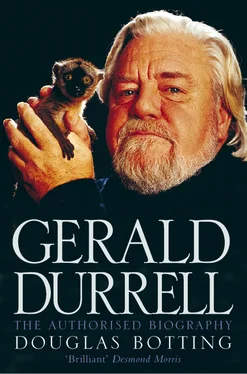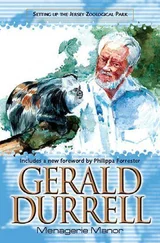‘Oh, hullo,’ said Larry in surprise. ‘What are you doing in London?’
‘Waiting for a boat,’ replied Gerald.
‘A boat? Ah, yes, London docks and so on. Down to the sea in shops. Well, ships in my experience are notoriously tardy. Either they don’t sail at all or else they sink, which gives you time for a drink.’
Larry suggested that to while away the time Gerald should look up an old friend and champion of his, a Sinologist and poet by the name of Hugh Gordon Porteus. Interesting chap, Larry told him. Lived in a cellar in Chelsea, played the organ and lived off horsemeat. ‘Knows a lot about Chinese poetry,’ Larry continued. ‘I think you’d like him – unless you’re too bloody English to eat horse.’
Hugh Porteus’s menage was every bit as eccentric as Gerald had been led to expect. A gaggle of nubile young women were gathered in the sitting room while Porteus stirred soup in a tin bidet (a trophy from one of the best brothels in Paris) on the gas ring.
‘I gazed on the scene,’ Gerald recorded in his notebook later. ‘Most of the girls were wearing very little else but diaphanous dressing gowns and bras and exciting lace panties underneath. The soup bubbled in the bidet. The horse steaks were lying in a row on the top of the bookcase.’ At seven o’clock sharp Porteus looked at his watch, pulled a miniature organ out of a cupboard, and called for silence. An infirm old lady by the name of Mrs Honeydew lived in the room above, and it was Porteus’s custom to play her a few tunes on his organ while she listened through the floorboards as she had her beef tea.
‘All right for sound, Mrs Honeydew?’ he shouted.
A walking stick could be heard rapping sharply on the ceiling, and Porteus settled himself more firmly on his stool.
‘The next minute we were engulfed in the Blue Danube ,’ Gerald recalled. ‘Everything in that enclosed space danced to the magnificent waltz. The girls’ breasts wobbled, the horse steaks on the bookcase quivered, the bidet trembled on the gas-ring, and a book by a sixth century traveller in China fell out of the bookcase. One of the girls suddenly put her warm hands in mine, drew me aloft as it were, pressed her warm and mobile mouth against mine, pressed herself to me and started to waltz.’
At this point Theodore Stephanides arrived. Now resident in London and working as a radiologist at Lambeth Hospital, Theo knew the Porters through Larry. Still every inch the Edwardian gentleman, he wore a tweed suit, 1908 waistcoat, highly polished boots and a staunch trilby, and sported a perky beard and moustache and a neat new steel-grey haircut. ‘Even I,’ noted Gerald, ‘who had known Theodore since the age of ten, would have been appalled at the idea of inserting him into such a milieu.’ The girls had never set eyes on a human being such as this before, and to the dismay of both Porteus and Gerald they greeted the new arrival with effusive admiration:
They cooed around him like doves round a fountain. They pressed olives on him and cheese biscuits. They sat round him in a ring of delicious fragrance, palpitating at each word he spoke. Theodore sat there like an ultra benevolent Father Christmas, delving into his considerable memory for jokes that Punch thought hilarious in 1898.
‘There is this – um – you know – a sort of tongue twister. I don’t know if you’ve heard it,’ ventured Theodore. “What noise annoys an oyster most – er – um – ha! A noisy noise annoys an oyster most.’
The girls rippled with liquid laughter, crowding closer to Theodore’s feet. This was the kind of humour they had not encountered before and to them it was as marvellous as finding a fully working spinning wheel in the attic.
So the frustrating evening wore on. Gerald and Porteus sat together disconsolate, ignored by the girls, who pressed round the scholarly, stuttering Theo. He reminisced about a friend of his in Paris, a freshwater biologist who kept a most interesting collection of Crustacea in a complex system of fourteen interconnecting bidets in his room. Dipping into his mushroom soup, he expounded at length on the lethal potential of this kind of dish – some 2841 different kinds of fungi, he said, and more than two thousand of them poisonous or deadly. ‘Gold, green, blue, hazel and olive-black eyes,’ Gerald recalled, ‘regarded Theo like a group of children who are being told the true story of Bluebeard.’
‘Did you know,’ later confided a wide-eyed girl whom Gerald particularly fancied, ‘that the gorilla has a brain capacity almost that of a man?’
‘I knew that,’ growled Gerald morosely, ‘when I was seven.’
At length Gerald received news that a vessel bound for the Cameroons was loading up in Liverpool – a banana boat in the form of an old German rustbucket seized by the British as war booty and due to sail at the beginning of December. He took the first train north, and secured his passage. Now at last, it seemed, he was on his way. Within a day or two Yealland had joined him, the expedition stores had been safely stowed in the hold and the personal baggage packed in the cabin. The good luck telegrams were delivered, the last goodbyes said and the gangway drawn up. And the ship refused to budge an inch from the dock.
On 2 December 1947, after three days on board, with the ship still defiantly tied up to the jetty, Gerald unpacked his portable typewriter and started his first missive to Mother – the first lengthy, coherent narrative he had written in his life.
Dear Mother,
We are still at Garston Docks in Liverpool. The bloody boat being a German one, no one seems to know anything about the inside of her. Something in the engines has given out, and so hordes of sweaty men are messing about in pools of oil. We have however had three days board and lodging at the expense of the firm, so that’s not too bad. What we object to is the view from our porthole: a very dirty length of jetty with a pile of rotting bananas on it. John says it might be rather pretty in the spring, if we stay long enough …
Their cabin was large and well-appointed, but what really staggered Gerald, long accustomed to rationed austerity in post-war Britain, was the food. ‘For breakfast,’ he crooned, ‘I had rolled oats (lots of milk and sugar) followed by kidneys and bacon with potatoes, toast and marmalade and butter (in a dish as big as a soup plate) and coffee.’ Even better, the booze was stunningly cheap, and flowed like water: ‘Beer (pre-war quality) costs us ten pence, whiskey and gin a shilling (two fingers), and we get fifty cigarettes for three shillings.’ The captain, Gerald noted, was ‘a stupid, pompous idiot of the worst kind’, but the rest of the officers were ‘sweet’. As for the other passengers, they were a ‘very queer lot’. But all were charming to the two young animal catchers, and were reassuringly encouraging about the abundance of animals there.
Don’t worry about us, as we are having a wonderful time. We spend most of the day screaming with laughter. We hope to leave tomorrow morning, with luck this evening.
Love
Gerry
But it was not until 14 December, a full fortnight after the pair had first clambered on board, and with their laughter worn a little thin by the interminable wait, that the ship finally cast off, eased out of the docks, turned left at the mouth of the Mersey and butted its way south down the Irish Sea, throbbing along towards the equator and the sun and the blue.
PART TWO Promise Fulfilled
EIGHT To the Back of Beyond First Cameroons Expedition 1947–1948
The ship broke down three more times, and in the Bay of Biscay the sea was so rough that Gerald and Yealland were thrown out of their bunks, along with all their kit. The weather hotted up by the time they reached the Canaries, and they watched entranced as the warm-water creatures of the ocean began to make their appearance around the ship, along with exotic insect stragglers – butterflies, dragonflies and a solitary orange ladybird – from the unseen African shore beyond the eastern horizon.
Читать дальше










